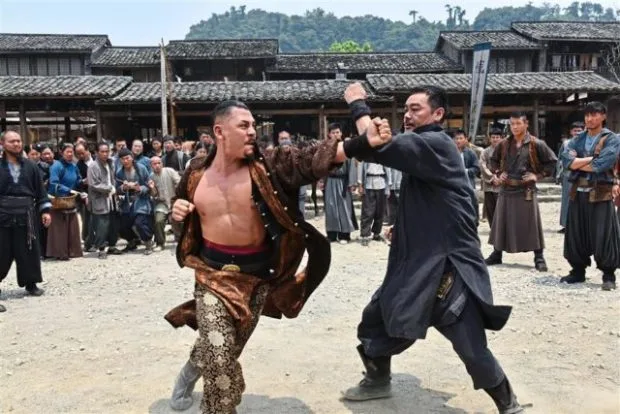
Hong Kong martial arts films have always had an evident spiritual connection to the Western – similar narratives playing out in different settings and with different weapons: fists and feet instead of Colts and Winchesters. This connection is drawn to the surface to full effect in Benny Chan’s Call of Heroes, as a mis-matched group of local heroes stand-off to protect a town from the psychopathic son of a warlord. Horse-back hero shots, sunsets, and a Morricone-lite score are notable Western icons in this otherwise blisteringly-violent and not-so-subtly political film. Add a dash of Mifune and a hefty helping of Sammo Hung’s excellent action direction and Call of Heroes is a gift for genre-lovers.
The film opens with a scene which suggests we’re in for a comedy – a ne’er-do-well loner, Ma Feng (Eddie Peng) thwarts a group of robbers at a restaurant, inadvertently rescuing Teacher Bai (Jiang Shuying) and her group of young students in the process. He refuses to help them further, though, even though they are escaping a sacked town to reach the hopeful safety of Pucheng. At Pucheng, a town lacking its protective army battalion but held strong by its sheriff Yang Kenan (Sean Lau) and his loyal but small band of warriors, the villagers are reluctant to let in even more refugees in. The arrival of the murderous son of a warlord, Cao (Louis Koo) signals soon enough that this film isn’t the comedy we might have thought it was. As Cao is held prisoner in Pucheng, his army, led by ambitious General Zhang Yi (Wu Jing), give the town 24 hours to release him, or they’ll raze the town to the ground. The townspeople and the sheriff must navigate the tricky dilemma in order to survive, with increasingly opposing views.

There’s something of a tonal inconsistency in Call of Heroes, as it veers between cheeky comedy, brutal violence and a gloomy outlook. It doesn’t always work, particularly Louis Koo’s entertainingly pantomimic performance as the villain Cao somewhat at odds with the more po-faced performance of Sean Lau and others. Luckily, the inconsistency in tone doesn’t full detract from what is a very entertaining film – Sammo Hung’s stupendous action choreography is revealed in well-paced set-pieces. The subtle wire-work adds just enough kung-fu magic to proceedings, without fully ascending to fantasy-levels of gravity defiance. The film is brutally violent at times too – particularly with an early murder of a main character – and it seems to me this is as much spaghetti Western homage as it is a response to the popularity of a film like The Raid or others from Indonesia and Thailand (see also Kill Zone 2, which directly links to Thailand via star Tony Jaa). Some of the set-pieces niftily recall classic kung-fu scenarios, with variations of battles on bamboo spikes or precariously balance pots highlights in the film.
If one thing is slightly distracting in the film it’s that it was obviously shot for 3D – but the 3D version was only seen in China. The film is very brightly lit, and suffers from that so-HD-it-looks-like-a-TV-show issue. There’s also some fairly obvious CGI work which would be more effective hidden behind 3D lenses. But, once you settle into the film, that doesn’t matter so much – the bone-crunching action and likeable heroes take over. Combined with a moral quandary that ties in to an increasingly tense political climate, Call of Heroes makes for imperfect but spectacular and intriguing viewing.
*Read Benny Chan’s interview about the film with SCMP here.
Call of Heroes is released to Region 2 DVD, Blu-ray and VOD on 2nd January 2017, from Cine Asia.